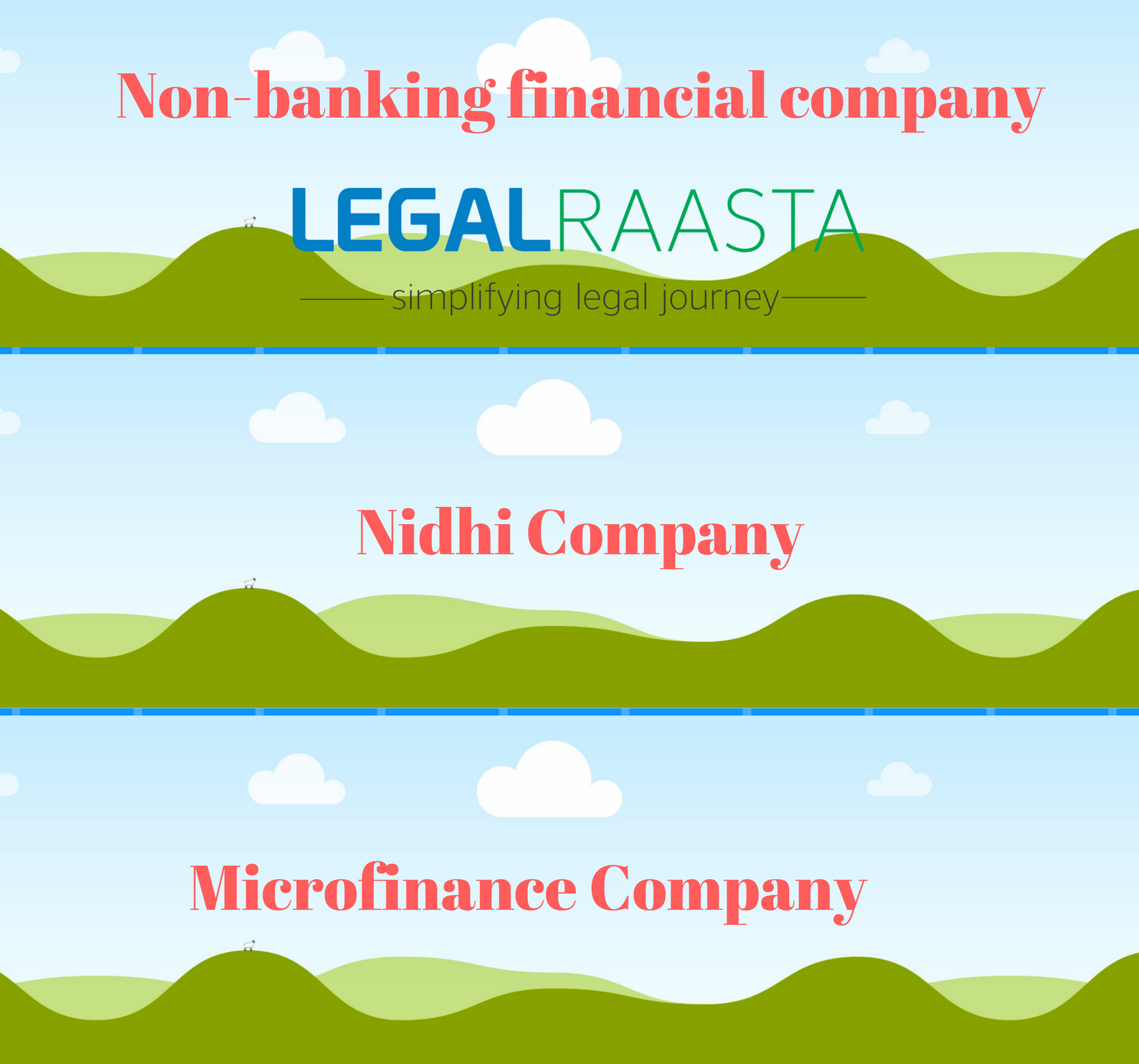NBFC Regulation
Overview of NBFC
A Non-Banking Financial Company (NBFC) is a financial institution. It carries on businesses under the
Companies Act 2013 like:-
- receiving personal loans and advances,
- Acquisition of stocks or shares,
- Leasing,
- Hire-purchase,
- Insurance business, and
- chit fund business.
In India, the authority to control the NBFC registration is with the Reserve Bank Of India(RBI).
Non-Banking Financial Company helps people with its variety of banking and non-banking services. They need to follow the rules and regulations made by RBI. According to the provisions mentioned in
Chapter III B of the RBI Act 1934, it's function is regulated and supervised.
NBFC Registration must be done as per the rules & regulations referred to in
Section 45-IA of the RBI Act 1934 and as per
companies Act 2013. There is a necessity of minimum net owned fund of Rs. 2 Crore in NBFC.
The main activity of their business is to raise funds from public depositors and investors and then lend to borrowers according to rules and regulations made by the Reserve Bank of India. They are an alternative to the banking and financial sector.
India's Regulatory Requirements of NBFC

After obtaining “Certificate of Registration” from the RBI only then NBFCs can start its operations.
- The company should be registered as a public limited company or private limited company in India
- The company should have mininmum net owned fund Rs.2 Crore.
(Note that, the net owned fund will be calculated as per the last audited balance sheet of the company.)
- NBFCs can accept or renew public deposits for a minimum period of 12 months and a maximum period of 60 months.
- Also, they can't accept deposits repayable on demand.
- NBFCs can offer interest rates not more than the ceiling rates referred by RBI from time to time.
- Offering gifts/incentives or any other additional benefit to the depositors is not allowed.
- There is a necessity of minimum investment-grade credit rating.
- There is no assurance by RBI for repayment of deposits by NBFCs.
- NBFC has to submit hard copies of the documents through the regional office of RBI.
Must Read: Prerequisites of NBFC Registration
Types of NBFCs
[caption id="attachment_20473" align="aligncenter" width="800"]

NBFC Regulation | Types |Legal Raasta[/caption]
NBFCs can be categorized on the basis of their liabilities or activities. Below we give in detail about them.
Based on Liabilities:
- Deposit Accepting NBFCs (NBFCs-D) [Deposit Taking]
- Non-Deposit NBFCs (NBFCs-ND) [Non-Deposit Taking]
- Systematically Important NBFCs-ND (NBFCs-ND-SI)
- Others NBFCs-ND
Based on Activities:
Asset Finance Company (AFC)
These type of companies involve financing physical assets such as:-
- Automobiles,
- Material handling equipment, and
- Industrial machines supporting economic activity.
Equipment Leasing Company
Equipment Leasing Company is a type of financial institution which carries its own principal business activity of leasing of equipment.
Hire Purchase Finance Company
It is a type of financial institution that carries its own principal business activity of hire purchase transactions.
Investment Company (IC)
It is a type of financial institution whose main business is related to the acquisition of securities.
Loan Companies (LC)
It is a type of institution which provides finance in the form of loans or advances. And they obtain funds by collecting deposits from the public, as well as give loans to small-scale traders.
Infrastructure Finance Company (IFC)
Net own funds of Infrastructure Finance Company is Rs.300 Crore, Credit rating ‘A’ or equivalent credit rating, CRAR of 15% and 75% in infrastructure loans.
Systemically Important Core Investment Company (CIC-ND-SI)
This company has deployed at least 90% of its assets(assets of Rs. 100 crores and above) in the form of investment in shares, debt instruments or loans in group companies. These companies also accept public funds.
Must read: Regulations governing NBFCs in India
Infrastructure Debt Fund (IDF-NBFC)
- These types of companies can be set up either as a trust or as a company and they are meant to infuse funds into the infrastructure sector.
- But if Infrastructure Debt Funds can set up as a trust, then it is a mutual fund. And it will be known as IDF-MF which is regulated by SEBI. The mutual fund would issue rupee-denominated units with 5 years of maturity to collect funds for the infrastructure projects.
- And in case Infrastructure Debt Funds can set up as a company, it will be an NBFC which will work under the guideline of RBI. Such companies are known as IDF-NBFC. IDF-NBFC is a type of non-deposit taking NBFC that has Net Owned Fund of Rs 300 crores or more and which invests only in Public-Private Partnerships (PPP). The post-commencement operations date (COD) infrastructure projects which have completed at least 1 year of satisfactory commercial operation and become a party to a Tripartite Agreement.
Non-Banking Financial Company-Micro Finance Institution (NBFC-MFI)
It is a non-deposit NBFC having it’s 85% of assets in the form of microfinance.
Microfinance needs to be in the form of loans given to those who all are having an annual income of Rs. 60,000 in rural areas and Rs. 120,000 in urban areas. Also, loans should not exceed Rs. 50,000. The duration of the loan should not be less than 24 months.
Non-Banking Financial Company
These companies should have a minimum Net Owned Fund of Rs. 5 Crore and its financial assets in the factoring business should constitute a minimum of 75 percent of its total assets. And its income derived through factoring business should be a minimum 75 percent of its gross income.
Housing Finance Company
It is a type of company whose main business is of financing of addition or construction of houses. And also includes the development of plots of lands for the construction of new houses.
Chit Fund Company
Chit Fund Company collects deposits from members on a periodic basis and distributes those funds between them as prizes. Members who enter into an agreement with chit Company subscribe for a particular period. The Chit Fund Act, 1982 governs the functions of the Chit Fund Company administered by the State Governments. And the deposit-taking activities works under the guideline of Reserve Bank of India(RBI)
Mutual Benefit Finance Company
These Companies also called “Nidhis”, are the non-banking finance companies that allow its members to pool their money into predetermined investment objective. The main sources of funds:-
- share capital,
- member deposits,
- public deposit
Must read about
Increase in Authorised Share Capital
Residuary Non-Banking Company
This company is a type of NBFC having the main business of the receiving of deposits, under any scheme, arrangement or in any other way and not being an investment, asset financing, and loan company. These types of companies have to maintain investments as per regulations of RBI, in addition to liquid assets.
For further information regarding
Company Incorporation,
Private Limited Company,
Public Limited Company you can visit our website:
Legal Raasta
Give us a call at
8750008585 and you can also send your query on Email:
[email protected]. OR you can download our
Legal Raasta app
Related Article
Micro Finance company Registration
Producer Company Registration
Section 8 Company Registration
 After obtaining “Certificate of Registration” from the RBI only then NBFCs can start its operations.
After obtaining “Certificate of Registration” from the RBI only then NBFCs can start its operations.
 NBFC Regulation | Types |Legal Raasta[/caption]
NBFCs can be categorized on the basis of their liabilities or activities. Below we give in detail about them.
NBFC Regulation | Types |Legal Raasta[/caption]
NBFCs can be categorized on the basis of their liabilities or activities. Below we give in detail about them.










